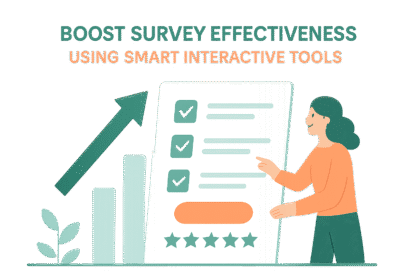
Crafting More Engaging and Effective Surveys: Discover Our Smart Tools
- Insight Syria specializes in innovative methodologies to enhance survey effectiveness.
- Traditional surveys often fail to capture the nuances of human decision-making.
- Interactive tools like Max-Diff and Card Sort provide deeper insights into preferences.
- Media monitoring keeps organizations informed about public sentiment and discourse.
- Practical tips for designing engaging surveys can help improve data collection efforts.
Table of Contents
- Why Traditional Surveys Often Fall Short
- Unlocking Deeper Insights with Interactive Survey Tools
- Max-Diff Exercise: Understanding True Preferences
- Card Sort Exercise: Structuring Information Effectively
- Drag & Drop Exercise: Interactive Preference Mapping
- Media Monitoring: Staying Ahead of the Curve
- Shopping Cart and Online Simulators: Simulating Real-World Choices
- The Insight Syria Advantage: Integrating Methodologies for Comprehensive Understanding
- Practical Tips for Designing Engaging Surveys
- Conclusion: Empowering Decisions with Smarter Data
Why Traditional Surveys Often Fall Short
Traditional survey methodologies, while foundational, can sometimes struggle to capture the nuances of human decision-making and preference. The limitations can include respondent fatigue, a tendency towards socially desirable answers, and an inability to fully gauge the relative importance of various attributes. For government bodies aiming to understand public needs, or organizations looking to tailor their services, a survey that feels like a chore rather than an engaging interaction can yield less than optimal results. This is precisely where our suite of smart tools comes into play, transforming the survey experience into a more insightful and productive endeavor.
Unlocking Deeper Insights with Interactive Survey Tools
At Insight Syria, we recognize that a one-size-fits-all approach to data collection is rarely the most effective. Our team of experts, blending data science with deep local knowledge, has curated and integrated a range of advanced tools designed to overcome the inherent challenges of traditional surveys. These tools are not merely technological novelties; they are sophisticated instruments that allow us to delve deeper into respondent motivations and preferences, providing richer, more reliable data for your strategic decision-making.
Max-Diff Exercise: Understanding True Preferences
One of the most powerful tools in our arsenal is the Max-Diff exercise, also known as Best-Worst Scaling. This methodology is exceptionally effective for determining the relative importance of different attributes, features, or benefits. Instead of asking respondents to rate each item on a scale (which can lead to respondents rating many items similarly), Max-Diff presents respondents with a series of subsets of items. In each subset, they are asked to identify the single most preferred and the single least preferred item.
How it works: Imagine you are researching preferences for public services. A traditional survey might ask respondents to rate the importance of safety, accessibility, affordability, and quality of service on a scale of 1 to 5. Many respondents might rate all as highly important, making it difficult to discern which is truly the most critical. A Max-Diff exercise, however, would present a subset of these, say, “Safety” and “Accessibility,” and ask the respondent to pick the most and least important. Then, another subset might be “Affordability” and “Quality of Service.” By systematically varying these subsets across respondents, we can statistically derive the overall importance of each attribute relative to the others.
Benefits for your organization: For government ministries, understanding which service improvements citizens prioritize is crucial for resource allocation. For businesses, identifying the most compelling product features or marketing messages can significantly boost sales and customer satisfaction. Max-Diff provides a clear, data-driven hierarchy of preferences, enabling targeted and impactful strategies. This is a prime example of how we leverage advanced methodologies to deliver actionable insights.
Card Sort Exercise: Structuring Information Effectively
The Card Sort exercise is invaluable for understanding how people naturally group and categorize information. This is particularly useful in website design, information architecture, product development, and even in understanding public perception of policy categories. In a Card Sort, respondents are given a set of “cards” (which can represent concepts, services, products, features, etc.) and asked to group them in a way that makes sense to them.
There are two primary types:
- Open Card Sort: Respondents are given the cards and asked to create their own categories and name them. This reveals spontaneous mental models and how users think about the information.
- Closed Card Sort: Respondents are given pre-defined categories and asked to sort the cards into these existing groups. This helps validate existing structures or identify where items might be misplaced within a proposed framework.
How it works: Consider a government agency looking to redesign its online portal for citizens. A Card Sort exercise could involve presenting cards representing various services (e.g., “Apply for a Permit,” “Pay Taxes,” “Request Public Records,” “Find Park Information”) and asking users to group them into logical categories for navigation. The results will reveal how people intuitively organize these services, guiding the development of a user-friendly interface.
Benefits for your organization: Whether you’re structuring a new product offering, organizing a complex dataset, or designing a user interface for a digital service, the Card Sort exercise provides direct insight into your target audience’s cognitive structures. This allows for the creation of intuitive and efficient systems that reduce confusion and improve user experience. Our expertise in executing these exercises ensures that the data collected directly informs your organizational structure and communication strategies.
Drag & Drop Exercise: Interactive Preference Mapping
The Drag & Drop exercise takes the concept of preference ranking to a more dynamic and engaging level. Instead of simply selecting items, respondents actively manipulate elements on a screen, dragging and dropping them into predefined slots or ordering them according to their preferences. This interactive format can significantly increase engagement and reduce the tedium often associated with traditional ranking tasks.
How it works: Imagine a scenario where you need to understand consumer priorities for mobile phone features. A Drag & Drop exercise might present a list of features like “Camera Quality,” “Battery Life,” “Screen Size,” “Price,” and “Storage Capacity,” along with several ranked slots (e.g., “Most Important,” “Second Most Important,” etc.). Respondents then drag each feature into the slot that best represents their preference.
Benefits for your organization: This tool is excellent for collecting ranked data in a visually appealing and intuitive manner. It’s particularly effective for online surveys and mobile applications, where it can capture attention and lead to higher completion rates. For businesses, it can help prioritize product development, marketing messaging, or service offerings based on what truly matters to their customers. This is a key area where our data analytics capabilities shine, transforming interactive inputs into meaningful insights.
Media Monitoring: Staying Ahead of the Curve
In today’s rapidly evolving Syrian environment, understanding public discourse and sentiment requires constant vigilance. Media monitoring is a critical component of our methodology, allowing us to track mentions of key organizations, policies, brands, or issues across various media channels. This includes traditional media (newspapers, radio, television) as well as digital platforms (social media, news websites, blogs).
How it works: Insight Syria employs sophisticated tools and expert analysts to systematically collect, analyze, and report on media coverage. We identify the volume of mentions, the sentiment expressed (positive, negative, neutral), key themes, influential voices, and emerging trends. This goes beyond simple keyword tracking; it involves understanding the context and implications of the discourse.
Benefits for your organization: For government entities, media monitoring is essential for crisis communication, reputation management, and understanding public reaction to policies. For businesses, it’s vital for brand perception, competitive analysis, and identifying market opportunities or threats. Our comprehensive media monitoring services ensure you are always informed about the narrative surrounding your organization or sector, enabling proactive and strategic responses. This constant flow of information fuels our broader data analytics efforts.
Shopping Cart and Online Simulators: Simulating Real-World Choices
To truly understand consumer behavior, especially in market research, we go beyond simple stated preferences. Our Shopping Cart and Online Simulators allow respondents to make choices in a simulated environment that mirrors real-world purchasing decisions. This can involve setting a budget and selecting items, or experimenting with different product configurations and price points.
How it works: For instance, if a company is launching a new product or exploring pricing strategies, we can create an online simulator. Respondents might be given a hypothetical budget and presented with various product options, each with different features and prices. Their choices within the simulator provide rich data on trade-offs, price sensitivity, and optimal product bundling. Similarly, a shopping cart simulator can replicate the online retail experience, allowing us to study purchasing patterns, add-to-cart behavior, and abandonment reasons.
Benefits for your organization: These tools offer a powerful way to predict market response to new products, pricing models, or promotional strategies. They capture actual behavior rather than just stated intent, leading to more accurate forecasting and reduced risk in market entry. Our data analytics team then dissects the data from these simulators to provide deep insights into consumer decision-making, directly informing your go-to-market strategies.
The Insight Syria Advantage: Integrating Methodologies for Comprehensive Understanding
What sets Insight Syria apart is our ability to not just offer these individual tools, but to integrate them within a cohesive research strategy tailored to the unique Syrian context. Our data scientists and research specialists work collaboratively to:
- Design the optimal methodology: We don’t just deploy tools; we strategically select and combine them based on your specific research objectives. A campaign to understand citizen satisfaction with public services might leverage a Max-Diff exercise for prioritizing service improvements, a Card Sort exercise to re-organize service delivery information, and media monitoring to gauge public perception of implemented changes.
- Ensure cultural and contextual relevance: Our deep understanding of Syrian society, its diverse populations, and its communication channels ensures that our surveys and data collection methods are culturally sensitive and contextually appropriate. This is crucial for obtaining honest and representative responses.
- Provide robust data analysis: The raw data from these interactive tools is processed using advanced statistical techniques. Our data analytics experts transform this information into clear, actionable insights presented in comprehensive reports and briefings.
- Offer tailored solutions: Whether you are a government organization seeking to improve public policy, an international NGO aiming to maximize impact, or a private sector business looking to understand its market, Insight Syria provides bespoke research solutions.
Practical Tips for Designing Engaging Surveys
For organizations looking to improve their own data collection efforts, even without our specialized tools, consider these principles:
- Know Your Objective: Clearly define what you want to learn from the survey. This will guide every decision, from question design to methodology.
- Keep it Concise: Respect your respondents’ time. Shorter surveys generally lead to higher completion rates and better quality data.
- Use Clear Language: Avoid jargon and technical terms. Ensure questions are easily understood by your target audience.
- Vary Question Types: Mix different question formats to keep respondents engaged. Our interactive tools are a prime example of this principle applied effectively.
- Test Your Survey: Before launching a large-scale survey, pilot test it with a small group to identify any confusing questions or technical issues.
- Incentivize Appropriately: Consider offering a small incentive for participation, if feasible and ethically sound.
Conclusion: Empowering Decisions with Smarter Data
In Syria, where understanding evolving needs and sentiments is critical for progress and stability, Insight Syria is your trusted partner. By leveraging innovative methodologies and smart tools like Max-Diff exercises, Card Sort exercises, Drag & Drop exercises, media monitoring, and shopping cart and online simulators, we move beyond traditional data collection to provide truly insightful and actionable intelligence. We are committed to helping government bodies, international organizations, and businesses make more informed decisions, engage more effectively with their stakeholders, and achieve their strategic goals in the complex Syrian environment. Partner with Insight Syria and experience the power of intelligent data.
Frequently Asked Questions (FAQ)
What is the Max-Diff exercise?
The Max-Diff exercise, or Best-Worst Scaling, helps determine the relative importance of different attributes by asking respondents to identify the most and least preferred items from subsets.
How does the Card Sort exercise differ from traditional surveys?
The Card Sort exercise allows respondents to categorize information in a way that makes sense to them, providing insights into their mental models, which traditional surveys often miss.
What benefits do media monitoring services provide?
Media monitoring services help organizations track public sentiment and discourse, which is vital for reputation management and strategic communications.
Can organizations use these methodologies on their own?
While organizations can apply some principles on their own, leveraging specialized methodologies and smart tools is often more effective for obtaining deep insights.
How can I contact Insight Syria for collaboration?
Organizations interested in collaboration can reach out through our official website where we provide tailored research solutions to meet unique needs.



